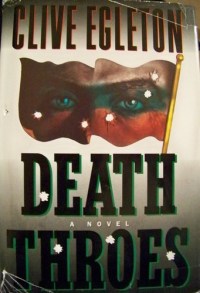Death Throes by Clive Egleton
 Thursday, January 6, 2011 at 1:18AM
Thursday, January 6, 2011 at 1:18AM 
First published in 1994
True to the form established in the first two Peter Ashton novels (Hostile Intent and A Killing in Moscow), Death Throes begins with a death. A Russian using the name Valentin has contacted SIS and asked to meet with Ashton in Bulgaria. Ashton goes to Sofia to meet Valentin's contact, only to find him dead in his apartment. Ashton is soon taken prisoner by the KGB and interrogated about Valentin. Escaping and returning to London, Ashton finds himself caught between Valentin, who wants to sell secrets in exchange for money, and some members of the SIS who want to use him as a pawn to uncover Valentin's identity. The plot takes Ashton to Estonia for another meeting with Valentin (but is it the same Valentin?) and to Berlin, where a related story unfolds concerning a former KGB hit man who assassinates a neo-Nazi leader.
Intricate plotting is Egleton's strength. The story in Death Throes sometimes seems a bit convoluted -- I often found myself reviewing earlier chapters to refresh my memory concerning the many characters who come and go as the plot develops -- but it all comes together by the novel's end. The downside to this novel is Egleton's writing style, which is sometimes less than graceful. In addition, Egleton has a tendency to bombard the reader with information that isn't particularly useful, like the price SIS paid for a safehouse before the market fell. And while I understand the need to provide background information from past novels so that this one can stand alone (which it does), Egleton sometimes overdoes it. Do we really need to learn (again) that Harriet (Ashton's love interest) obtained "a good upper second in Geography at Birmingham University" before taking the various positions that led to her current employment with SIS?
Perhaps as a result of the digressions about educational backgrounds and job histories and real estate markets, Death Throes does not move with the same pace as the earlier novels (despite a few well written action scenes), and it suffers from the same occasional clunky prose that troubled me in Hostile Intent. There is also less development of Ashton's character in Death Throes than there was in A Killing in Moscow, although more attention is paid to Harriet and to Ashton's relationship with her. All told, I liked Death Throes, but not as much as Hostile Intent and certainly not as much as A Killing in Moscow.
RECOMMENDED
 TChris |
TChris |  Post a Comment |
Post a Comment |  Clive Egleton,
Clive Egleton,  spy in
spy in  Thriller
Thriller
Reader Comments